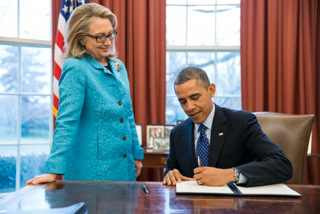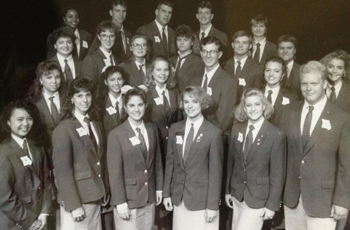Gloria Feldt's Blog, page 13
March 8, 2013
Malala Yousafzai: On International Women’s Day, Honoring A Fearless Leader at Just 15 Years Old
Malala Yousafzai is living proof that leadership comes in all shapes and sizes, genders, ethnicities, nationalities, and ages. We usually think of history being made by people with some years on them, but this courageous young woman demonstrates that anyone of any age can be a history maker.
In 2009, Yousafzai began sharing her stories under a pseudonym for the BBC. Yousafzai documented the drop in attendance of girls at her school after an increased concern over safety. Just after her blog ended, the Taliban temporarily banned women from going to jobs and to the market. In Pakistan she and her father received death threats in person, in newspapers, and online.
Despite the dangers associated with reaching out to press, Yousafzai continued to talk to media to advocate equal education. She could be the poster child for No Excuses Power Tool #8: employ every medium.
In 2012, the young activist was shot by members of the Taliban in the Swat district of Pakistan, while returning home from school. Yousafzai was targeted after being recognized in Pakistan for advocating education for all girls. Even though Yousafzai was shot at point blank range, she lived to tell the tale.
During her first address to the public after the shooting, she restated her cause:
“I want every girl, every child, to be educated.”
Yousafzai has made history since then by becoming the youngest Nobel Peace Prize nominee ever. Her identity was revealed when her father formally nominated her for a peace prize.
In honor of her efforts for girls’ education, Gordon Brown launched a petition that aims to have all girls in schools by 2015. The goals of the petition are: to outlaw discrimination against girls in every country, to plan to deliver education for every child in Pakistan, and to ensure the world’s 61 million out-of-school children are in education by the end of 2015.
Yousafzai is an inspiration to all who seek integrity in our work. Even in the midst of death threats, even after seeing schools destroyed, even after being shot—she has remained true to her message. And she has shined a light that illuminates a burgeoning movement as women rise, determined to take their rightful place in the world.
On March 8, International Women’s Day, I would like to say we honor her, but in truth, with her courage and willingness to act even in the face of such horrific violence, Malala Yousafzai honors the strength and resilience of all women around the globe today.
March 6, 2013
Images of Gender Equality Aspirations and Achievements
The UN Commission on the Status of Women has New York hopping with powerful and, yes, ambitious female leaders from around the world this week. Each is making women’s history in her own way.
Today, I share just a few images of events I’m attending.
Are you attending? If so, please share your impressions.
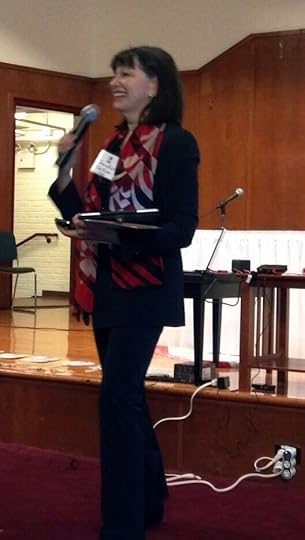
It was my honor to introduce Kathy Wan-Povi Sanchez, Tewa Women United, co chair US Women Connect, and potter from the iconic Maria Sanchez family. She facilitated a panel on Preventing Violence Against Native Women.
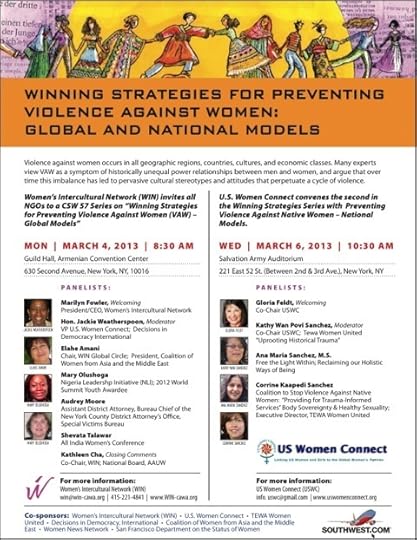
I am nearing the end of my term as co-chair of US Women Connect, and had the honor of introducing an amazing panel of Native Women women speaking from their deepest hearts about healing from and preventing violence.
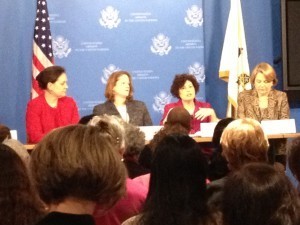
At the US Mission to the UN, these four women who work for the State Department recounted the work the Obama administration is doing globally to prevent gender based violence. There was much cheering when Congress’ recent passage of the Violence Against Women Act, protecting women here at home, was mentioned.
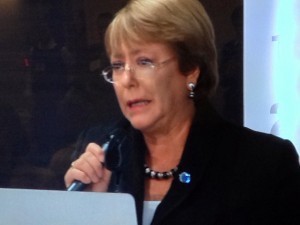
Michelle Bachelet has long been my role model. Currently Executive Director of US Women and former president of Chile. She emphasizes ACTION. A woman after my heart.
Television anchor and entrepreneur Joya Dass and I celebrated the launch of IMPACT 21 Leadership with its founder Janet Salazar. Joy and I both participated in a lively panel discussion of women’s emerging power globally and locally.
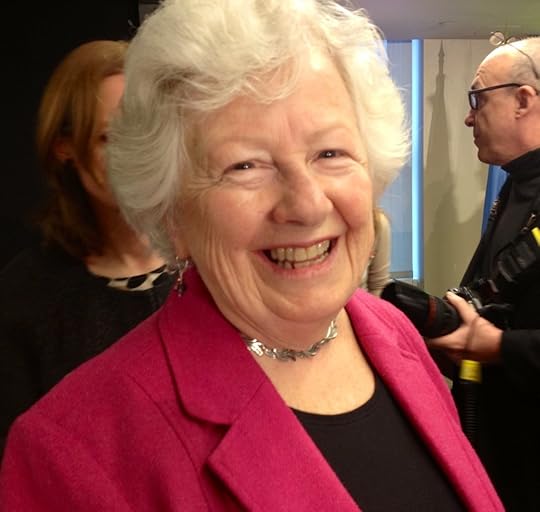
I ran into Linda Tarr Whelan, a long time colleague in women’s advancement and leadership work. Currently Distinguished Senior Fellow at the Demos think tank, Linda and I commiserated about our inability to retire. There remains much work to be done.
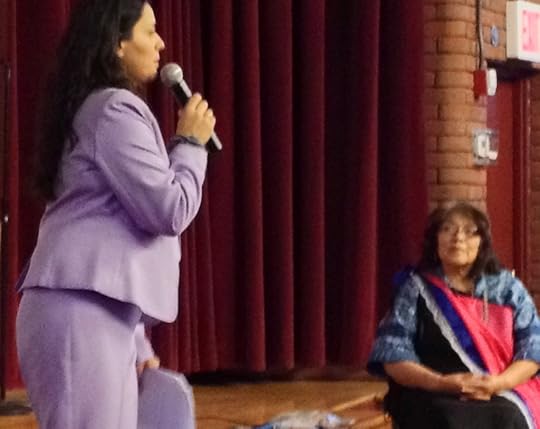
Ana Maria Sanchez, author, spiritual healer, and domestic violence survivor speaks about her experience. Kathy Wan-Povi Sanchez, leader of Tewa Women United facilitated the panel on preventing violence against Native women.
March 4, 2013
Marissa Mayer: How to Make the Wrong Kind of History in Two Easy Lessons
It’s March—Women’s History Month. I look forward to highlighting outstanding women each year. I was especially eager to profile Marissa Mayer this year. Mayer made history in July 2012 when she became the first woman CEO of Yahoo! and the first woman chosen to head a Fortune 500 company while pregnant.
But unfortunately, lately she’s made history in the negative. The strides she made in her own career could soon be overshadowed by steps backward she’s made for other women—and men too, as it turns out.
The first sign trouble was brewing in paradise came even as Mayer was being lauded for bursting through the silicone barrier while demonstrating women have both brains and uteri. Apparently she forgot a few chapters of her own history when she said in the recent PBS “Makers” interview:
“I don’t think that I would consider myself a feminist…I don’t I think have sort of the militant drive and sort of the chip on the shoulder that sometimes comes with that…There are amazing opportunities all over the world for women.”
Umm, how does a female a CEO of a Fortune 500 company think she became one? And even if she doesn’t want to throw a nod to the feminist movement that opened doors for her, is she completely oblivious to any female “first’s” responsibility to help other women advance?
But that turned out to be just the beginning. The second lesson in how not to make history came a few days before Women’s History Month 2013 began.
Mayer, who built a nursery next to her office for herself with her own money has issued a new policy requiring all Yahoo! employees, or Yahoos as they like to call themselves in that jocular Silicon Valley way, to work in the office every day, rather than telecommute as many have been doing.
Now, I understand why a new CEO, especially in a troubled organization, needs to take disruptive actions to shake things up enough to get people thinking differently. And Mayer is on a rescue mission at Yahoo!
Most new CEO’s take dramatic action of some kind to help communicate their vision as well. But Mayer seems to have a tin ear about how to communicate change. And unfortunately for the men and women in her company, Mayer’s new edict that no one can work from home, sends exactly the wrong, and rather retrograde, message. If she wants everyone to work from the office, why didn’t she create a company child care center, or to subsidize child care for employees?
Because really, should a woman or a man be fired for caring for a sick child, or any child, if at the same time the employee is putting in his or her hours at home and delivering the work assigned?
As professor of family history Stephanie Coontz noted in her brilliant New York Times commentary recently, ” In 1990, the United States ranked sixth in female labor participation among 22 countries…By 2010…we had fallen to 17th place, with about 30 percent of that decline a direct result of our failure to keep pace with other countries’ family-friendly work policies.”
But flexible workplace practice isn’t only about taking care of the kids. I started working from home one day a week many years ago when I was a CEO. My children were grown by then. I simply was more productive, could think better without the office distractions, and could finish complex projects requiring deep concentration more effectively than when I was in the office. And I found that giving workers at least some level of flexibility to get the work done without counting the hours they were behind their desks raised productivity and loyalty overall.
Mayer paradoxically telegraphs her financial privilege to “have it all” with her office nursery, while leaving her employees without the flexibility of benefits that bolster gender equality.
There’s been debate on whether Mayer or Sheryl Sandberg, author of the forthcoming book Lean In has the right approach to workplace flexibility and women’s advancement. Sandberg suggests“you can both love your kids and your job, and you don’t need to be around all the time at either to be good at doing both.”
Sandberg is right. And she knows her “lean in” argument works only because there has been a deep and broad feminist revolution creating opportunities women in previous generations didn’t have. Continuing progress, the kind of positive history we want to make, depends on women, and like-minded men, moving forward together.
Mayer is not only wrong; she’s tone deaf about why she’s wrong. I predict she’ll have to recant her new policy in part within the month.
Your thoughts?
Check back every few days for fresh Women’s History Month posts here on 9 Ways.
February 14, 2013
My 5 Fave parts of Obama’s 2013 State of the Union Address
The yoga class I took just before last night’s State of the Union (SOTU) address wiped me out. I fell asleep immediately afterward. Which is good because I had a chance to think overnight about the parts that resonated most with me.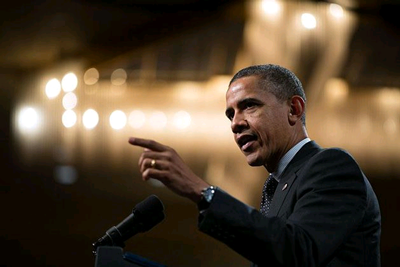
I’ve been tough on the president in the past, disappointed with his timidity and unwillingness to set a big bold agenda.
The other good thing about writing the day after is that others have fact checked. And the de rigeur liberal critique as well as Sen. Ted Cruz’s (R-TX) really awful other-party rebuttal have been duly hashed and rehashed.
With the benefit of reflection, here are my three favorite parts of the speech.
1. SOTU and women: On the domestic front, the president mentioned two hot button pieces of legislation poised to pass if Speaker Boehner (R-BadLoser) ever brings them up for votes:
We know our economy is stronger when our wives, mothers, and daughters can live their lives free from discrimination in the workplace, and free from the fear of domestic violence. Today, the Senate passed the Violence Against Women Act that Joe Biden originally wrote almost 20 years ago. I urge the House to do the same. And I ask this Congress to declare that women should earn a living equal to their efforts, and finally pass the Paycheck Fairness Act this year.
(This drew a “Huge Yes!” from Pamela Scharf when I posted it on Facebook.)
And on the global front, but equally true at home:
We also know that progress in the most impoverished parts of our world enriches us all. In many places, people live on little more than a dollar a day. So the United States will join with our allies to eradicate such extreme poverty in the next two decades: by connecting more people to the global economy and empowering women; by giving our young and brightest minds new opportunities to serve and helping communities to feed, power, and educate themselves; by saving the world’s children from preventable deaths; and by realizing the promise of an AIDS-free generation.
2. SOTU and gun violence: This drew the biggest cheers as Obama did his rhetorical best: build to a revival preacher’s crescendo. And the backdrop of Gabby Giffords and parents of slain children brought everyone but John Boehner (go figure, for once he showed no emotion) to tears.
It has been two months since Newtown. I know this is not the first time this country has debated how to reduce gun violence. But this time is different. Overwhelming majorities of Americans – Americans who believe in the 2nd Amendment – have come together around commonsense reform – like background checks that will make it harder for criminals to get their hands on a gun. Senators of both parties are working together on tough new laws to prevent anyone from buying guns for resale to criminals. Police chiefs are asking our help to get weapons of war and massive ammunition magazines off our streets, because they are tired of being outgunned.
Each of these proposals deserves a vote in Congress. If you want to vote no, that’s your choice. But these proposals deserve a vote. Because in the two months since Newtown, more than a thousand birthdays, graduations, and anniversaries have been stolen from our lives by a bullet from a gun.
One of those we lost was a young girl named Hadiya Pendleton. She was 15 years old. She loved Fig Newtons and lip gloss. She was a majorette. She was so good to her friends, they all thought they were her best friend. Just three weeks ago, she was here, in Washington, with her classmates, performing for her country at my inauguration. And a week later, she was shot and killed in a Chicago park after school, just a mile away from my house.
Hadiya’s parents, Nate and Cleo, are in this chamber tonight, along with more than two dozen Americans whose lives have been torn apart by gun violence. They deserve a vote.
Gabby Giffords deserves a vote.
The families of Newtown deserve a vote.
The families of Aurora deserve a vote.
3. SOTU and minimum wage: Did the proposed $9 minimum wage surprise you? It did me.
We know our economy is stronger when we reward an honest day’s work with honest wages. But today, a full-time worker making the minimum wage earns $14,500 a year. Even with the tax relief we’ve put in place, a family with two kids that earns the minimum wage still lives below the poverty line. That’s wrong. That’s why, since the last time this Congress raised the minimum wage, nineteen states have chosen to bump theirs even higher.
Tonight, let’s declare that in the wealthiest nation on Earth, no one who works full-time should have to live in poverty, and raise the federal minimum wage to $9.00 an hour. This single step would raise the incomes of millions of working families. It could mean the difference between groceries or the food bank; rent or eviction; scraping by or finally getting ahead. For businesses across the country, it would mean customers with more money in their pockets. In fact, working folks shouldn’t have to wait year after year for the minimum wage to go up while CEO pay has never been higher. So here’s an idea that Governor Romney and I actually agreed on last year: let’s tie the minimum wage to the cost of living, so that it finally becomes a wage you can live on.
4. SOTU and early childhood education: This warmed my former Head Start-teacher heart.
Tonight, I propose working with states to make high-quality preschool available to every child in America. Every dollar we invest in high-quality early education can save more than seven dollars later on – by boosting graduation rates, reducing teen pregnancy, even reducing violent crime. In states that make it a priority to educate our youngest children, like Georgia or Oklahoma, studies show students grow up more likely to read and do math at grade level, graduate high school, hold a job, and form more stable families of their own. So let’s do what works, and make sure none of our children start the race of life already behind. Let’s give our kids that chance.
5. The part of SOTU I liked best. Karl Rove (who reminds me of the Riddler because he keeps popping up with his evil grin, every time you think a superhero has finally vanquished him), used a twitter hashtag #notserious to telegraph the Tea Party message of the day. A typical corrosive Rove tweet:
Is it me or is this not one of POTUS’s better efforts? Lackluster response from even Dem’s side. #SOTU
Since you asked, I’ll answer. It’s you, Karl. The president’s speech was not just #serious. It hit a political home run. Now let’s see what action Congress takes, and how hard Obama fights for his agenda.
What do you predict?
February 6, 2013
She’s Doing It: Cry at Work? Here’s Why Selena Soo Says You Can
I loved this blog post by business strategist and founder of S2 Groupe Selena Soo so much that I asked her if I could republish it here on 9 Ways.
What crying experiences do you have to share? Do you agree with Selena’s reasons why she says it’s OK?
Last summer, my friend introduced me to a potential client (whom I’ll refer to as “Ryan”).
Ryan was a highly-respected entrepreneur who had built multiple million-dollar businesses. He was funny, quirky, and visionary. I thought we were a match made in business heaven.
Ryan and I would talk on the phone and on Skype.
I sent him five pages of my ideas, and in our next conversation, he hired me on the spot. I was on cloud nine and excited to get started, and then the next day he broke up with me. Ryan told me that things were moving too quickly. “You don’t just marry the first person you date,” he explained.
Ryan said that he would be talking to several other PR and marketing firms. He wanted to make an objective, informed decision. I told him I understood. I thanked him for his honesty.
When he visited New York a few weeks later, we met up for coffee at the Ace Hotel. Then we walked over to Madison Square Park. We sat next to the fountain, talked about our Myers-Briggs personality types, and then he proceeded to break my heart. “I think you’re great,” he explained, “but these are my reservations about hiring you…”
Essentially, he felt that I did not have enough experience. I had just started my company. He wanted someone more established. It was painful to hear, but I’m glad he was so honest with me. I didn’t have to wonder why it didn’t work.
I went back to my office and explained to my interns what had happened. As I went into the details, my voice started to shake. And then I burst into tears.
Why Crying Is Good
People always say, “Never cry in the office! Suck it up! Cry alone or in the bathroom.” But I don’t care. Crying is good.
Crying is an honest expression of our emotions.
Most importantly, our emotions are our power. For me, the intense power behind my emotions is what drives my ambition and success.
Unfortunately, in our culture, crying is considered taboo. In traditional work environments, we are expected to stifle our emotions rather than express and address them. We falsely perceive those who are tough and emotionally shut down as somehow more competent in business.
Now, I’m not suggesting that we cry in the office all the time. But what I am saying is that your emotions are okay. When you’re doing work you love, and especially when you’re running your own business, it’s only natural to be emotionally attached.
Why Do We Cry?
It’s because we feel so deeply. It’s because we care so much. It’s because that one thing we want means everything to us. I feel blessed to have experiences that move me to tears. Because if I didn’t, what kind of life would I be living?
I’ve always had big dreams. Dreams that were much bigger than my current reality. And that is what ambition really is: pursuing a goal or desire outside of your immediate reach. Whenever this happens, failure and disappointment is always a very real possibility. But that’s okay. Actually, it’s good.
I once heard Cheryl Dorsey, president of social venture fund Echoing Green, say, “If all our investments work out, we know we have failed.” What a wise woman, and what a powerful statement.
What Cheryl meant is that if Echoing Green only pursued investment opportunities where success was guaranteed, her organization wouldn’t have taken any risks. As we know, the greater the risk, the greater the reward. So without taking risks, Echoing Green would have been missing out on the biggest opportunities.
The same goes with your life.
As one of my favorite sayings goes, “If your dreams don’t scare you, they’re not big enough.”
It’s completely true. If you want to reach your full potential, start getting uncomfortable. Start taking risks. Expect rejection, pain, and disappointment. Allow the fear and emotions to run through your entire body, even if it feels paralyzing. It’s part of what it means to be truly alive. In fact, your deepest discomfort signals your greatest area for growth. When you recognize this, your emotions become your most powerful source of wisdom.
Everything Always Works Out
The beautiful thing about life is that everything always works out. While Ryan and I did not end up working together, I’m so glad I had that experience. I learned a lot from my interactions with him. I learned a lot from my pain.
Pain is actually our greatest teacher. As human beings, we tend to learn more through pain than we do through pleasure. From that perspective, the pain of this loss was its gift to me. Not only that, it was Ryan’s gift to me, and I’m grateful for that.
I learned not to put all my eggs in one basket, and I learned that what you think you want might not actually be what’s best for you. For the month of July, I did not pursue any other clients because I was convinced that things would work out with Ryan.
Once I turned my attention away from him, other people started approaching me about helping them with their businesses. As I started talking to these potential clients, I realized that what I was looking for was in front of me all along, and I didn’t even see it.
This is why I love Jack Canfield’s quote, “Everything you want also wants you.” If something is truly meant to be, it will happen. If you’re truly the best person for the job, others will see it.
Yes, you still have to work hard and show them everything you’ve got, but there is no need to force your desired outcome. Have faith that everything will work out beautifully. Trust that whatever happens is always the best possible outcome, and know that what you are looking for is always within your reach.
Have you ever lost something you wanted so badly that it moved you to tears? Did you later realize that this loss was actually a blessing in disguise? Please share in the comments below!
Selena Soo (founder of S2 Groupe) is a business strategist for personal brands, focusing on marketing and publicity. Through her signature course Elevate Your Brand, Selena loves helping visionary entrepreneurs, experts, and coaches reach more people and change the world.
February 1, 2013
She’s Doing It: Thank You Hillary Clinton
Hillary Clinton’s star turn as Secretary of State exemplifies an important leadership lesson.
Sometimes, you win when you lose. And by putting yourself forward toward a big goal, even if you don’t reach it, you usually accomplish much more than if you had aimed toward a lower goal and achieved it instead. And what a legacy!
Ambassador Swanee Hunt wrote this marvelous analysis. But Clinton summed it up well herself, in this memo sent by the White House shortly after the baton was passed to now former Senator John Kerry.
U.S. DEPARTMENT OF STATE
Office of the Spokesperson
For Immediate Release
January 31, 2013
2013/0102
STATEMENT BY SECRETARY CLINTON
Presidential Memorandum on Promoting Gender Equality and
Empowering Women and Girls Globally
The Obama Administration has made it clear that advancing the rights of women and girls is critical to the foreign policy of the United States. This is a matter of national security as much as it is an issue of morality or fairness. President Obama’s National Security Strategy explicitly recognizes that “countries are more peaceful and prosperous when women are accorded full and equal rights and opportunity. When those rights and opportunities are denied, countries lag behind.”
That’s why I’m so pleased about the Presidential Memorandum that President Obama signed yesterday, which institutionalizes an elevated focus on global women’s issues at the State Department and USAID and ensures coordination on these issues across the federal government. And it is so important that incoming Secretary of State John Kerry has expressed his support for the continued elevation of these issues in our foreign policy.
As I have said many times, protecting and advancing the rights of women are critical to solving virtually every challenge we face as individual nations and as a community of nations. We have made great progress, but there is more to do. This is the unfinished business of the 21st Century, and it is essential that it remains central to our foreign policy for years to come.
# # #
SDI: Thank You Hillary Clinton
Hillary Clinton’s star turn as Secretary of State exemplifies an important leadership lesson.
Sometimes, you win when you lose. And by putting yourself forward toward a big goal, even if you don’t reach it, you usually accomplish much more than if you had aimed toward a lower goal and achieved it instead. And what a legacy!
Ambassador Swanee Hunt wrote this marvelous analysis. But Clinton summed it up well herself, in this memo sent by the White House shortly after the baton was passed to now former Senator John Kerry.
U.S. DEPARTMENT OF STATE
Office of the Spokesperson
For Immediate Release
January 31, 2013
2013/0102
STATEMENT BY SECRETARY CLINTON
Presidential Memorandum on Promoting Gender Equality and
Empowering Women and Girls Globally
The Obama Administration has made it clear that advancing the rights of women and girls is critical to the foreign policy of the United States. This is a matter of national security as much as it is an issue of morality or fairness. President Obama’s National Security Strategy explicitly recognizes that “countries are more peaceful and prosperous when women are accorded full and equal rights and opportunity. When those rights and opportunities are denied, countries lag behind.”
That’s why I’m so pleased about the Presidential Memorandum that President Obama signed yesterday, which institutionalizes an elevated focus on global women’s issues at the State Department and USAID and ensures coordination on these issues across the federal government. And it is so important that incoming Secretary of State John Kerry has expressed his support for the continued elevation of these issues in our foreign policy.
As I have said many times, protecting and advancing the rights of women are critical to solving virtually every challenge we face as individual nations and as a community of nations. We have made great progress, but there is more to do. This is the unfinished business of the 21st Century, and it is essential that it remains central to our foreign policy for years to come.
# # #
January 23, 2013
She’s Doing It: IntergenFem and You…Join In!
Look who picked me up. Come join us and tweet your opinions at the #InterGenFem tweet chat 1/31 at 2pm eastern.
Intergenerational feminism.
Does it exist?
Can we do a better job?
Why does working together across differences (generation is just one of many, including race, class, gender, sexuality, ability) matter for the cultural and political goals feminists are looking to achieve?
These conversations keep happening, and the idea for this TweetChat grew out of a great conversation that happened spontaneously on Twitter between @AndreaPlaid, @erintothemax, @ShelbyKnox, @StephHerold, @veronicaeye and @WentRogue. Along the way we picked up @GloriaFeldt and now we’re hoping to pick up YOU (yes, YOU are enthusiastically invited!) to join us for a broader conversation that is intended to be productive, solutions-oriented and totally helpful to your personal and professional endeavors to realize justice in this lifetime.
Some of the themes to discuss:
1. “Young feminism” – what does it mean?
2. Organizational feminism – what is and isn’t connecting with different age groups?
3. How does race and racial privilege intersect with intergenerational issues in the movement?
4. What is the unfinished business of feminism?
5. What does sharing power look like?
6. What can we all do to better support each other?
Is there more that needs to be discussed? Good. That’s another reason for you to join, so you can bring it up.
TweetChat is Thursday, Jan. 31. Use the hashtag #InterGenFem.
#InterGenFem + YOU = Join In!
Be there 2-3 p.m. and tell your friends.
January 21, 2013
I Have a Dream…Martin Luther King’s Memorable Speech
I am happy to join with you today in what will go down in history as the greatest demonstration for freedom in the history of our nation.
Five score years ago, a great American, in whose symbolic shadow we stand today, signed the Emancipation Proclamation. This momentous decree came as a great beacon light of hope to millions of Negro slaves who had been seared in the flames of withering injustice. It came as a joyous daybreak to end the long night of their captivity.
But one hundred years later, the Negro still is not free. One hundred years later, the life of the Negro is still sadly crippled by the manacles of segregation and the chains of discrimination. One hundred years later, the Negro lives on a lonely island of poverty in the midst of a vast ocean of material prosperity. One hundred years later, the Negro is still languishing in the corners of American society and finds himself an exile in his own land. So we have come here today to dramatize a shameful condition.
In a sense we have come to our nation’s capital to cash a check. When the architects of our republic wrote the magnificent words of the Constitution and the Declaration of Independence, they were signing a promissory note to which every American was to fall heir. This note was a promise that all men, yes, black men as well as white men, would be guaranteed the unalienable rights of life, liberty, and the pursuit of happiness.
It is obvious today that America has defaulted on this promissory note insofar as her citizens of color are concerned. Instead of honoring this sacred obligation, America has given the Negro people a bad check, a check which has come back marked “insufficient funds.” But we refuse to believe that the bank of justice is bankrupt. We refuse to believe that there are insufficient funds in the great vaults of opportunity of this nation. So we have come to cash this check — a check that will give us upon demand the riches of freedom and the security of justice.
We have also come to this hallowed spot to remind America of the fierce urgency of now. This is no time to engage in the luxury of cooling off or to take the tranquilizing drug of gradualism. Now is the time to make real the promises of democracy. Now is the time to rise from the dark and desolate valley of segregation to the sunlit path of racial justice. Now is the time to lift our nation from the quick sands of racial injustice to the solid rock of brotherhood. Now is the time to make justice a reality for all of God’s children.
It would be fatal for the nation to overlook the urgency of the moment. This sweltering summer of the Negro’s legitimate discontent will not pass until there is an invigorating autumn of freedom and equality. Nineteen sixty-three is not an end, but a beginning. Those who hope that the Negro needed to blow off steam and will now be content will have a rude awakening if the nation returns to business as usual. There will be neither rest nor tranquility in America until the Negro is granted his citizenship rights. The whirlwinds of revolt will continue to shake the foundations of our nation until the bright day of justice emerges.
But there is something that I must say to my people who stand on the warm threshold which leads into the palace of justice. In the process of gaining our rightful place we must not be guilty of wrongful deeds. Let us not seek to satisfy our thirst for freedom by drinking from the cup of bitterness and hatred.
We must forever conduct our struggle on the high plane of dignity and discipline. We must not allow our creative protest to degenerate into physical violence. Again and again we must rise to the majestic heights of meeting physical force with soul force. The marvelous new militancy which has engulfed the Negro community must not lead us to a distrust of all white people, for many of our white brothers, as evidenced by their presence here today, have come to realize that their destiny is tied up with our destiny. They have come to realize that their freedom is inextricably bound to our freedom. We cannot walk alone.
As we walk, we must make the pledge that we shall always march ahead. We cannot turn back. There are those who are asking the devotees of civil rights, “When will you be satisfied?” We can never be satisfied as long as the Negro is the victim of the unspeakable horrors of police brutality. We can never be satisfied, as long as our bodies, heavy with the fatigue of travel, cannot gain lodging in the motels of the highways and the hotels of the cities. We cannot be satisfied as long as the Negro’s basic mobility is from a smaller ghetto to a larger one. We can never be satisfied as long as our children are stripped of their selfhood and robbed of their dignity by signs stating “For Whites Only”.
We cannot be satisfied as long as a Negro in Mississippi cannot vote and a Negro in New York believes he has nothing for which to vote. No, no, we are not satisfied, and we will not be satisfied until justice rolls down like waters and righteousness like a mighty stream.
I am not unmindful that some of you have come here out of great trials and tribulations. Some of you have come fresh from narrow jail cells. Some of you have come from areas where your quest for freedom left you battered by the storms of persecution and staggered by the winds of police brutality. You have been the veterans of creative suffering. Continue to work with the faith that unearned suffering is redemptive.
Go back to Mississippi, go back to Alabama, go back to South Carolina, go back to Georgia, go back to Louisiana, go back to the slums and ghettos of our northern cities, knowing that somehow this situation can and will be changed. Let us not wallow in the valley of despair.
I say to you today, my friends, so even though we face the difficulties of today and tomorrow, I still have a dream. It is a dream deeply rooted in the American dream.
I have a dream that one day this nation will rise up and live out the true meaning of its creed: “We hold these truths to be self-evident: that all men are created equal.”
I have a dream that one day on the red hills of Georgia the sons of former slaves and the sons of former slave owners will be able to sit down together at the table of brotherhood.
I have a dream that one day even the state of Mississippi, a state sweltering with the heat of injustice, sweltering with the heat of oppression, will be transformed into an oasis of freedom and justice.
I have a dream that my four little children will one day live in a nation where they will not be judged by the color of their skin but by the content of their character.
I have a dream today.
I have a dream that one day, down in Alabama, with its vicious racists, with its governor having his lips dripping with the words of interposition and nullification; one day right there in Alabama, little black boys and black girls will be able to join hands with little white boys and white girls as sisters and brothers.
I have a dream today.
I have a dream that one day every valley shall be exalted, every hill and mountain shall be made low, the rough places will be made plain, and the crooked places will be made straight, and the glory of the Lord shall be revealed, and all flesh shall see it together.
This is our hope. This is the faith that I go back to the South with. With this faith we will be able to hew out of the mountain of despair a stone of hope. With this faith we will be able to transform the jangling discords of our nation into a beautiful symphony of brotherhood.
With this faith we will be able to work together, to pray together, to struggle together, to go to jail together, to stand up for freedom together, knowing that we will be free one day.
This will be the day when all of God’s children will be able to sing with a new meaning, “My country, ’tis of thee, sweet land of liberty, of thee I sing. Land where my fathers died, land of the pilgrim’s pride, from every mountainside, let freedom ring.”
And if America is to be a great nation this must become true. So let freedom ring from the prodigious hilltops of New Hampshire. Let freedom ring from the mighty mountains of New York. Let freedom ring from the heightening Alleghenies of Pennsylvania!
Let freedom ring from the snowcapped Rockies of Colorado!
Let freedom ring from the curvaceous slopes of California!
But not only that; let freedom ring from Stone Mountain of Georgia!
Let freedom ring from Lookout Mountain of Tennessee!
Let freedom ring from every hill and molehill of Mississippi. From every mountainside, let freedom ring.
And when this happens, when we allow freedom to ring, when we let it ring from every village and every hamlet, from every state and every city, we will be able to speed up that day when all of God’s children, black men and white men, Jews and Gentiles, Protestants and Catholics, will be able to join hands and sing in the words of the old Negro spiritual,
“Free at last! free at last! thank God Almighty, we are free at last!”
January 16, 2013
She’s Doing It: Construction Woman Nikki Stallion Brewer Asserts Herself
I meet the most fascinating people when I speak to groups! Lifestyle brand maven Claudia Chan invited me to be part of a panel at Anheuser Busch Women in Beer in (of course) St. Louis. There, I met this amazing woman who went from being an abandoned child in South Korea to running her own construction company in. I’m inspired and think you will be too!
GF: The first question because I am fascinated with women’s relationship with power is this: When did you know you had the power to_____? You fill in the blank.
Describe the moment or series of events that let you know you had the power to_____. What did it feel like?
NSB: Assert myself.
I realized I had this “power” when I was around 16 years old and very active in 4-H on a state level. I decided to run for state treasurer which meant, I was to give a campaign speech to an audience of about 500 in the Jesse Auditorium of the University of Missouri campus. When I started speaking, it was the first time I could hear myself outside of my own ears. I did not recognize the voice, the tone, and especially the confidence I heard. In case you are wondering, I did win!1990 4-H State Council Jesse Auditorium of the University of Missouri campus.
GF: Tell a little about your background, your family and how you grew up, and what led you to your current work.
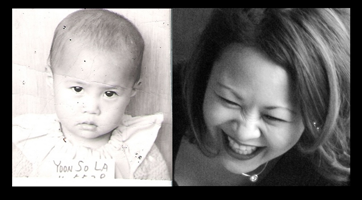 NSB: This is the picture my parents saw when they “picked me” and something more current.
NSB: This is the picture my parents saw when they “picked me” and something more current.
I am a foreign-born, abandoned, foster child, adoptee and extremely thankful for it! I was found outside of Seoul, South Korea on the doorstep of the mayor of BooChun City. When I was 21 months old, I was adopted by my American parents, Mike and Gail Stallion and flying to the Anchorage, Alaska airport then to my new home in Fairbanks. Later I grew up in Cape Girardeau, MO.
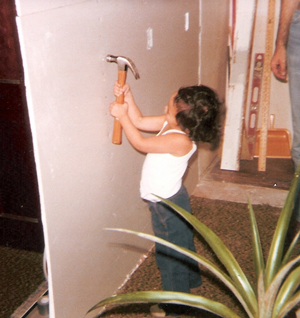
My father started a construction company. I was always interested in construction but as I got older it faded… to boys and shopping.
In 1997 I was back in Cape Girardeau after an unfinished college career and a failed marriage. Dad had an offer for me to work for him at Mac Con Company for 1 year and he would move me anywhere I wanted to go. I took the offer. About six months in, I knew I was where I was supposed to be.
In 2004 I decided to start a separate company with my father as my business partner called ZanneCo, derived from my middle name Suzanne. After 2 years of great success balance sheet-wise, I was very frustrated with not being approved for a WBE status because I did not hold an engineering degree and my father did, “I could not be the primary decision maker” for the company. I sold my share to my father and went to a new city but my heart continued to tell me I was not in the right place. I returned to ZanneCo to be an employee for the company I had once owned.
Failure was at the forefront of my mind but I knew it was where I belonged and realized because I did not let my ego that had led me away from the company I loved get in the way this time.
Still working for ZanneCo today I look at the chain of events and know the path chosen was probably the best for future things to come professional and personally.
 Staying in the area instead of moving to a new city ultimately lead me to my best friend and husband Jay who 3 years after we met was offered a job with Anheuser Busch InBev in St. Louis (ironically my destination when I left ZanneCo). We moved to St. Louis less than a month of him accepting the position.
Staying in the area instead of moving to a new city ultimately lead me to my best friend and husband Jay who 3 years after we met was offered a job with Anheuser Busch InBev in St. Louis (ironically my destination when I left ZanneCo). We moved to St. Louis less than a month of him accepting the position.
I now work out of my home in St. Louis with visits to my office in Cape Girardeau. I am privileged to still be a part of the company I started and work with my father.
GF: What are you hoping to accomplish in your work?
NSB: Besides the obvious financial security, I hope through my work I can become like so many of the role models I spoke of earlier who help to nurture and grow more leadership. I specifically want to direct my focus on young women in the male-dominated fields. Many women in these fields have worked hard to get to where they are and are inherently strong individuals but this does not mean they do not need encouragement.
Secondly, even though construction does not directly tie in with adoption, I hope to be an advocate for adoption whenever I can. In 2011, my husband Jay and threw me a birthday party but the gifts were not for me. We worked with a non-for-profit organization called “Room for One More” and clothing designer Turya Nation founder and owner of Guy Baxter to have a fashion show benefit. All the proceeds went to adoption grants through the organization for families that were approved by adoption agencies. The grants assist these families with national and international adoption costs.
GF: What is the message you’d like to give to the world today?
NSB: Failure is an inevitable step in all careers and life. Just make sure it is not the last.
GF: What is the best leadership lesson you have learned?
NSB: I am a huge Harry Potter fan and like to think of leadership like a wizard or witch’s magic. Harry was taught all of this wonderful magic at Hogwarts but when he is to return home to the muggle world, he cannot use magic outside of school. In my mind, this is critical because learning restraint is as important as leaning the magic itself.
When I was younger, I tried to be a leader in everything. I was on every board I was asked to serve, I joined every committee; I was the YES woman, I could not say no to a good cause. In a couple of years I was completely burned out and empty. I realized if I did not use restraint and truly weigh the time commitment and how much that “good cause” really fit within my vision and goals for myself, I was no good to the ones I really cared about.
GF: What other observations or advice about women, power, and leadership would you like to share?
NSB: There is a tendency for people, but I think especially women, to start a corrective statement with “I’m sorry”. Example, “I’m sorry, but that report is for the first quarter not the last.” I think there is something primal inside us that tells us we are caretakers and if someone else is wrong… it must be our fault in some way! Don’t fall into the trap!
Assert yourself!
I love shoes, so there is a theme to my social media names! Stay connected with me:
www.linkedin.com/in/nikkistallionbrewer
http://facebook.com/NikkiSueSlipper
https://twitter.com/nikkisueslipper



